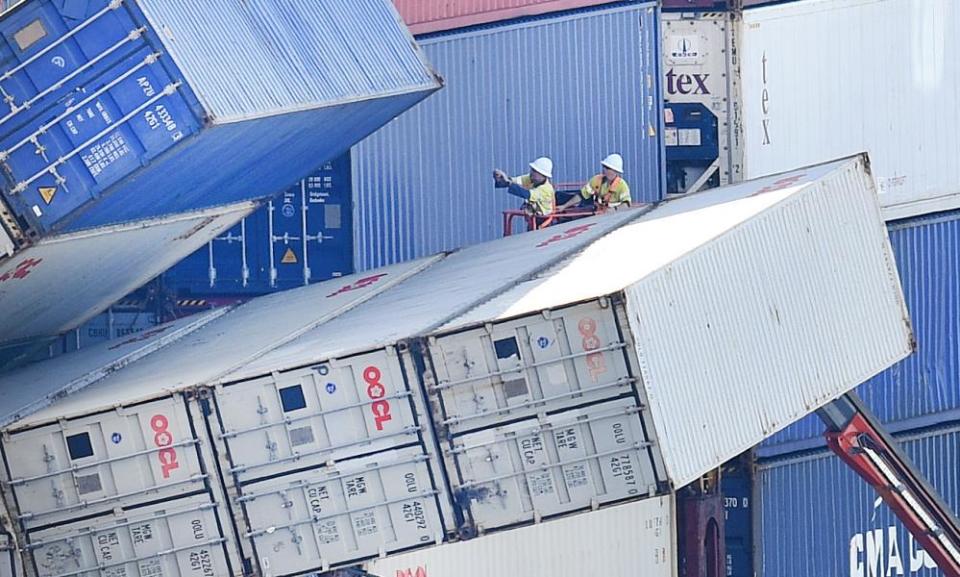Labor asks for investigation into $30m jobkeeper payments to Qube despite earnings increase

The Labor frontbencher Andrew Leigh has asked the auditor general to broaden an investigation into the jobkeeper program to look at how the port operator Qube received $30m in wage subsidies even though its revenue did not fall as a result of the coronavirus crisis.
In a letter sent on Tuesday and seen by Guardian Australia, Leigh asked Grant Hehir to investigate discussions with between Qube, the Australian Taxation Office and the Treasury in April last year, first reported by Michael West Media, that resulted in the company being approved for jobkeeper.
He also asked Hehir to investigate whether millions of dollars in bonuses paid to executives are consistent with the spirit of the measures and look into allegations the company was trying to claw jobkeeper back from employees.
As Guardian Australia reported last month, Hehir is auditing the administration of the jobkeeper scheme after a request from Leigh, who has criticised companies that received the subsidy and went on to pay millions of dollars in dividends or executive bonuses.
Company accounts show that Qube received $13.5m in jobkeeper in the 2020 financial year, which ran to the end of June, and an additional $16.8m in the six months to the end of December.
Under the rules of the $100bn program, employers with revenue over $1bn a year, such as Qube, were eligible for jobkeeper from 30 March if they had a real or projected fall in revenue of 50% or more.
Related: Auditor general to investigate jobkeeper after it was used to pay dividends and bonuses
Qube’s annual report shows its revenue for the 2020 financial year, which ran to the end of June, increased slightly, from $1.84bn to $1.9bn, compared with the previous year.
And in the six months to the end of December, revenue fell only slightly, from $957m to $939m, compared with the same period in 2019.
But jobkeeper was also available to individual company subsidiaries that experienced large falls in revenue, even if the group as a whole did not suffer.
On 14 April a director of Qube’s ports and bulk goods subsidiary told a union official that the company did not believe it would qualify for jobkeeper, according to a witness statement reported by Michael West Media.
Two days later, “after lengthy discussions with the Department of Treasury and the Australian Taxation Office, it was determined that Qube would be eligible for the subsidy from April 2020”, the director said according to the statement.
Qube’s director of corporate affairs, Paul White, said the Michael West Media report was “inaccurate misleading and included a number of false statements”.
But he confirmed to Guardian Australia that the 16 April meeting between Qube, the ATO and Treasury took place.
On 1 April “Qube wrote to Treasury seeking clarification and information from the commonwealth as to how jobkeeper would be applied and offered to provide a briefing about our operations”, White said.
“We were advised at a meeting with the ATO and Treasury on April 16 2020 that a business number test would be used to assess whether forecast revenue would drop by more than 50% and Qube Ports would therefore qualify.
“That decision was made prior to our first meeting with Treasury.”
He said “in accordance with good governance, the ATO has since fully audited the Ports business and found that all payments had been applied correctly and in accordance with the legislation”.
Qube used jobkeeper to “avoid large-scale retrenchments”, he said.
“In Qube’s case these would have occurred in regional ports where alternative employment, particularly during the worst of Covid, would have been almost impossible to find,” he said.
He said the company had used the subsidy to pay 60 workers who were stood down and 1,400 who were on reduced hours.
“Had jobkeeper not been available, those employees would have had pay reductions of up to 40% in accordance with the relevant enterprise agreement, which allows for pay adjustments during period where no work is available at regional ports,” he said.
He said bonuses paid during the pandemic had been limited to half the maximum available and were not influenced by jobkeeper.
The company announced last week it would repay the $16.8m it received in the six months to the end of December.
“The board decided that it was the right thing to do given the strong rebound in the economy and Qube’s stronger performance in the latter part of last year which was a significant positive turnaround from the previous six months,” White said.
He did not address the allegation Qube was trying to claw jobkeeper payments back from workers.

 Yahoo Movies
Yahoo Movies 